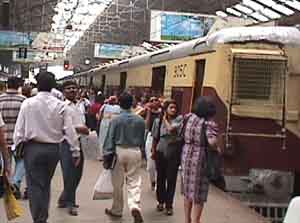|
Travelogues Mumbai: City of Hope
|
|||||
I entered this city after my wedding. The nerve centre of India, where Bollywood thrives, is always on the move, 24 hours a day, 365 days a year. Born and brought up in the state of Karnataka, I was used to a clean environment, cities that are not so densely populated and a less crowded public transportation system. When I was shifting to Mumbai, I was given an assortment of advice from friends and relatives regarding this city all of which made me both nervous and curious about settling in Mumbai. |
More on Maharashtra •Forts of Maharashta
Travelogues
Impressions | ||||
I As we reached the platform, I saw a local train approaching. My first reaction was that of shock. The train was overflowing with people, some were hanging from the train, others had settled themselves between the bogies, some were holding onto the rails on the windows for dear life. It was a nightmare. Realization slowly dawned that it was practically impossible to even go close to such a train. I decided to wait for the next train despite my husband's warning that all the trains would be equally crowded. The next train was no better. Finally, with lots of persuasion, we boarded the following train. I did not dare to go in the ladies compartment preferring to tag along with my husband in the general compartment. The time to travel alone arrived on the first day I started working. My husband gave me a list of instructions before I reluctantly moved towards the large group of ladies standing on the platform, craning their necks to see if they could spot the train. As I reached them, there was a flurry of movement. Ladies were clutching their purses tight, tying their duppattas, their hair, etc. One look at the compartment and I backed away, terrified. The ladies inside were hanging from a single rod, while those outside were falling over each other, and pushing one another in an effort to enter the already overcrowded train. The sight was unbelievable. I was sure that I could not ever enter such a crowded train. Trains came and went, but the crowd remained. In 10 minutes, perforce I changed my mind. Going towards the front of the crowd, as the train stopped I found that one moment, I was standing outside and lo, the next moment, I was taken inside in a big swoop without any effort whatsoever. Boarding local trains is an art. You have to learn to allow yourself to get pushed into the train. There are chances of falling unless you learn to get a strong foothold once you are in. The next step is to barge in hoping for a slim chance of sitting down. Once inside, I suddenly realized that my purse and duppatta were no longer with me. I just had the strap of the purse. I heard someone shouting "Yeh kiskaa purse hai idhar?" (Whose purse is this here?) I got a glimpse of my purse crushed, but intact. My dupaata was tougher to retrieve firmly being clutched, without realizing it, by a lady who was holding her own. I heard many languages spoken by women in diverse professions. Idly listening to the countless conversations going on around me, and after a while, I became aware that an argument had ensued. One voice screamed, "Apna haath hataao" (Move your hand), and heard a loud "Aap apne baal aage karo" (Move your hair!). This was countered with "Aap adjust nahi kar sakthi to train mein kyo aate ho, auto mein jaaon" (If you cannot adjust in the train, why do you travel by train, go in an auto). Finally, an exasperated voice said, "Mein ek plaster laana bhool gayi, warna aapke mooh pe lagaa deti band (I forgot to get a strip of plaster; or else I would have applied it on your mouth). The only difference travelling by first class, apart from the fare, was the language in which insults were traded. In the second-class compartments, people abused each other with terms like "Bhais" (buffalo), "Paagal" (maniac), whereas in the first class compartment, insults were in English. As the days and months flew by, I got used to the 3-hour commute to office. After several days, I realised that the quarrels were merely a way of ridding oneself of the day's frustrations so I learnt not to take things to heart, but laughed off remarks on the occasions when I did not respond with a retort myself. There were times verbal quarrels graduated to physical fighting. I remember an instance when a fisherwoman balancing a big basket on her head boarded the train. A strong, pungent odour of fish took over the jam-packed train. The train came to a sudden halt at a station and due to the jerk the basket came tumbling down, emptying its contents on to the head and shoulders on a girl standing next to her, reducing her to tears. The same women, who would be violent, showed a heart of gold at other times. They are very helpful when they are aware that you are new to the city. Hearing a child crying in a compartment, they will invariably do anything to console the little one. The world's largest slums are located in Mumbai, but the city keeps all its inhabitants bound. Rarely does anyone elect to leave the city. Each day is a new experience, and you never know what is in store for you. Days, weeks and months fly past you without your realizing it. Life in Mumbai is hectic, but there is a quality of joy and a hope that the city itself exudes. Life here is an interesting journey, where you enthusiastically look forward to each new day, new dreams, new hopes…
|
|||||
Editor: Romola Butalia (c) India Travelogue. All rights reserved. |
|||||
